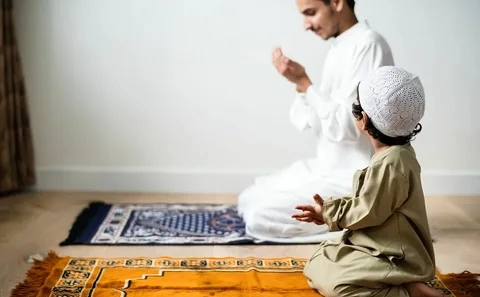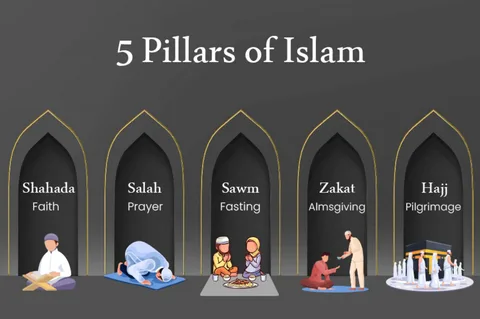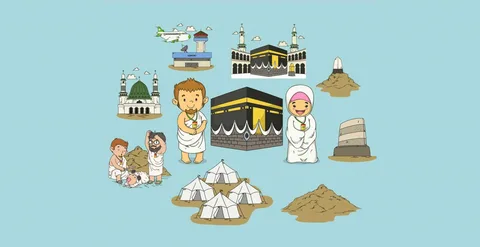Islam, a faith followed by over a billion people worldwide, is rich with rituals that shape the daily lives of its adherents. These rituals, embedded in the core teachings of the Quran and the Hadith, serve as a constant reminder of faith, community, and the path to spiritual fulfillment, in this article on Arabian Tongue website we will explorer Rituals in Islam.
Understanding Islamic Rituals

Islamic rituals are acts of worship and devotion that Muslims perform to honor their faith and connect with Allah. These practices are not mere traditions; they are essential aspects of a Muslim’s spiritual journey.
Importance of Rituals in Islam
Rituals in Islam provide structure and discipline to the lives of believers. They foster a sense of community, reinforce religious teachings, and help Muslims stay mindful of their duties to Allah and humanity.
The Five Pillars of Islam

The Five Pillars of Islam are fundamental acts of worship that form the foundation of a Muslim’s faith and practice. They are Shahada, Salah, Zakat, Sawm, and Hajj.
Shahada: The Declaration of Faith
The Shahada is the Muslim profession of faith, expressing the belief in the oneness of Allah and the prophethood of Muhammad. It is a simple yet profound statement: “There is no god but Allah, and Muhammad is the Messenger of Allah.” This declaration is the entry point into the Islamic faith.
Salah: The Daily Prayers
Significance of Salah
Salah, the obligatory Muslim prayers performed five times a day, are a direct link between the worshipper and Allah. These prayers are a cornerstone of Islamic life, providing regular intervals for reflection, supplication, and connection with the Divine.
How to Perform Salah
Each of the five daily prayers consists of a series of movements and recitations, including standing, bowing, and prostrating, all while facing the Kaaba in Mecca. The prayers are performed at dawn, noon, mid-afternoon, sunset, and evening.
Zakat: Giving to Charity
Importance of Zakat
Zakat, one of the Five Pillars, is the act of giving a portion of one’s wealth to those in need. It is not merely an act of charity but a duty that purifies wealth and ensures its fair distribution within the Muslim community.
How Zakat is Calculated
Zakat is typically 2.5% of a Muslim’s savings and wealth above a certain threshold, known as the nisab. This practice helps alleviate poverty and support the welfare of the community.
Sawm: Fasting During Ramadan
The Purpose of Fasting
Sawm, or fasting during the month of Ramadan, is a time of spiritual reflection, self-discipline, and empathy for the less fortunate. Muslims abstain from food, drink, and other physical needs from dawn until sunset.
Rules and Benefits of Fasting
Fasting during Ramadan is obligatory for all adult Muslims, with exceptions for those who are ill, elderly, pregnant, nursing, traveling, or facing other hardships. The fast is broken each evening with a meal called iftar, and the pre-dawn meal before the fast begins is called suhoor. Fasting cultivates patience, resilience, and a deepened sense of gratitude.
Hajj: The Pilgrimage to Mecca
The Journey of Hajj
Hajj, the pilgrimage to Mecca, is a once-in-a-lifetime obligation for those who are physically and financially able. It takes place annually during the Islamic virtues month of Dhu al-Hijjah and involves a series of rituals that commemorate the actions of the Prophet Ibrahim and his family.
Rituals Performed During Hajj
Pilgrims perform a series of rites, including Tawaf (circling the Kaaba), Sa’i (walking between the hills of Safa and Marwah), and standing at Arafat. These acts symbolize unity, humility, and the soul’s journey towards Allah.
Rituals in Islam
Islamic daily rituals help Muslims maintain their spiritual focus and integrate their faith into everyday life.
Wudu: The Act of Purification
Wudu, the ritual washing before prayer, involves washing the hands, mouth, nostrils, face, arms, head, and feet. This act of purification is both physical and spiritual, preparing the believer to stand before Allah.
Du’a: Personal Supplications
Du’a, or personal supplications, are prayers that Muslims recite in addition to the obligatory Salah. These prayers can be made at any time and for any reason, reflecting a personal and intimate communication with Allah.
Recitation of the Quran
The Quran, the holy book of Islam, is recited daily by Muslims around the world. Reciting and memorizing the Quran is considered a meritorious act that brings spiritual rewards and deepens one’s understanding of the divine message.
Observing Halal Dietary Laws
Muslims adhere to dietary laws that prescribe permissible (halal) and forbidden (haram) foods and drinks. Halal dietary practices ensure that the food consumed is pure, wholesome, and in accordance with Islamic teachings.
Life Event Rituals
Islamic rituals extend beyond daily practices to significant life events, marking milestones with spiritual significance.
Birth Rituals
The Aqiqah ceremony is performed on the seventh day after a child’s birth. It involves the sacrifice of an animal, the shaving of the baby’s head, and the giving of a name. This ritual expresses gratitude to Allah for the gift of a child.
Marriage Rituals
The Nikah is the Islamic marriage contract between a man and a woman. It involves the mutual consent of both parties, the presence of witnesses, and the payment of a dowry (mahr) to the bride. The Nikah is a solemn agreement that sanctifies the union.
Importance of Marriage in Islam
Marriage is highly valued in Islam as a means of fulfilling physical, emotional, and spiritual needs. It is seen as a partnership based on love, compassion, and mutual respect.
Death Rituals
The Janazah (Funeral) Prayer
The Janazah prayer is a communal prayer offered for the deceased, asking Allah for mercy and forgiveness. It is performed in congregation and is an important part of Islamic funeral rites.
Burial Practices
Islamic burial practices include washing the body, shrouding it in a simple white cloth, and burying it facing Mecca. These practices reflect the belief in the sanctity of the human body and the hope for resurrection.
Community and Social Rituals
Islamic rituals also emphasize community and social bonding through collective worship and celebrations.
Friday Prayers (Jumu’ah)
Jumu’ah, the congregational prayer held every Friday, is a significant weekly event for Muslims. It includes a sermon (khutbah) and offers a chance for communal worship and reflection.
Eid Celebrations
Eid al-Fitr
Eid al-Fitr marks the end of Ramadan and is celebrated with prayers, feasting, and charity. It is a time of joy, gratitude, and community.
Eid al-Adha
Eid al-Adha commemorates the willingness of Prophet Ibrahim to sacrifice his son in obedience to Allah. It involves special prayers, the sacrifice of an animal, and sharing the meat with family, friends, and the needy.
Islamic New Year (Hijri New Year)
The Islamic New Year, also known as the Hijri New Year, marks the migration of the Prophet Muhammad from Mecca to Medina. It is a time for reflection and renewal of faith.
FAQs
What is the significance of the Five Pillars of Islam?
The Five Pillars of Islam are foundational acts of worship that define a Muslim's faith and practice. They guide Muslims in their relationship with Allah and their responsibilities to the community.
How often should Muslims perform Salah?
Muslims are required to perform Salah five times a day at prescribed times: dawn, noon, mid-afternoon, sunset, and evening.
What is the importance of Zakat in the Muslim community?
Zakat is crucial for wealth redistribution and social welfare in the Muslim community. It helps alleviate poverty and supports those in need, promoting economic justice.
Can non-Muslims participate in Islamic rituals?
While non-Muslims can observe and learn about Islamic rituals, participation in certain acts of worship, such as Salah and Hajj, is reserved for Muslims. However, non-Muslims can engage in community events and celebrations.
How do Islamic rituals differ across cultures?
Islamic rituals have core elements that remain consistent, but cultural practices and traditions can influence how these rituals are observed. This diversity enriches the global Muslim community while maintaining the essence of Islamic worship.
Conclusion
Islamic rituals are integral to the faith, providing structure, purpose, and a means to connect with Allah and the Muslim community. From daily practices to life event rituals, these acts of worship and devotion enrich the lives of Muslims and strengthen their spiritual journey.


